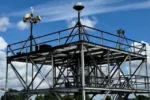Indonesia’s multibillion-dollar acquisition of French-made Dassault Rafale fighters has reached a critical milestone. The first aircraft designated for the Indonesian Air Force (TNI-AU) has successfully conducted its maiden test flight in France. This event signals tangible progress in Jakarta’s effort to modernize its combat aviation fleet amid rising strategic competition in the Indo-Pacific.
Test Flight Marks Key Milestone in $8.1 Billion Deal
The inaugural flight of Indonesia’s first Rafale fighter occurred at Dassault Aviation’s Mérignac facility near Bordeaux in early September 2025. This aircraft is part of a landmark $8.1 billion contract signed between Indonesia and France in February 2022 for the procurement of 42 Rafale F4-standard multirole fighters.
The test flight confirms that production and integration work are proceeding on schedule for the initial batch of six aircraft—part of Tranche 1 under the contract. According to Dassault Aviation and Indonesian defense officials, these six units are expected to be delivered by mid-2026 following completion of testing and pilot conversion training.
The Rafales will replace aging F-5E/F Tiger II jets and supplement existing Su-27/30 Flanker variants operated by TNI-AU. The F4 variant introduces enhanced radar (RBE2 AESA), upgraded Spectra EW suite, improved data fusion capabilities, and compatibility with new-generation munitions such as the MBDA Meteor BVRAAM and AASM precision-guided bombs.
Contract Structure and Offset Commitments
Indonesia’s Rafale deal is structured into three tranches totaling 42 aircraft:
- Tranche 1: Six aircraft (firm order)
- Tranche 2 & 3: Remaining 36 aircraft (to be finalized)
The agreement includes not only airframes but also comprehensive support packages—covering training systems, simulators, mission planning tools—and significant industrial cooperation components.
Dassault Aviation has committed to substantial technology transfer and local industry participation through PT Dirgantara Indonesia (PTDI). While full assembly remains in France due to complexity constraints, PTDI is expected to play a growing role in MRO (maintenance, repair & overhaul), parts manufacturing, and ground support systems integration over time.
Pilot Training Pipeline Underway
TNI-AU pilots have begun undergoing conversion training on the Rafale platform since late 2024 at French Air & Space Force facilities. The training syllabus includes simulator sessions using Thales-developed full-mission simulators as well as live flights under French instructor supervision.
This training pipeline is essential given the generational leap from legacy platforms like Hawk Mk209s or F-5s to a fully networked fourth-plus generation fighter like the Rafale F4. Ground crews are also being trained concurrently for maintenance operations under OEM guidance.
Strategic Implications for Southeast Asia
The induction of Rafales will significantly enhance Indonesia’s airpower posture. With advanced sensors (RBE2 AESA radar), long-range weapons (Meteor), electronic warfare capabilities (Spectra), and robust multirole performance across air-to-air and strike missions, TNI-AU will gain credible deterrence power across its vast archipelagic geography.
This acquisition also positions Indonesia among an exclusive group of Asian nations operating Western high-end fighters—joining India’s IAF as another regional user of the Rafale platform. It marks a diversification away from traditional Russian suppliers amid growing concerns over sanctions compliance and logistics reliability post-Ukraine war.
Moreover, Jakarta’s move aligns with broader efforts across ASEAN states to modernize fleets amid rising tensions over South China Sea access rights and increased Chinese military activity near key maritime chokepoints like the Sunda Strait.
Dassault’s Export Success Continues
The Indonesian deal adds momentum to Dassault Aviation’s export portfolio following successful sales to Egypt (54), India (36+), Qatar (36), Greece (24), UAE (80) and Croatia (12). The company continues positioning the Rafale as a versatile alternative to U.S.-origin platforms like F-16V or Eurofighter Typhoon—especially where political autonomy or offset flexibility are valued by buyers.
Dassault CEO Éric Trappier has emphasized that Indonesia’s order reflects “a long-term strategic partnership,” noting that follow-on contracts could include additional platforms such as UAVs or maritime surveillance assets under French OEM consortia involving Thales and Safran.
Looking Ahead
The next milestones for Indonesia’s program include completion of pilot training cycles by Q1 2026; delivery acceptance testing for Tranche 1 jets; infrastructure upgrades at Iswahjudi Air Base; and potential finalization of Tranches 2–3 orders depending on budgetary allocations from Jakarta’s Ministry of Defense.
If fully executed through all phases by early 2030s, the program could transform TNI-AU into one of Southeast Asia’s most capable air forces—combining indigenous sustainment capability with cutting-edge Western combat aviation technology.










